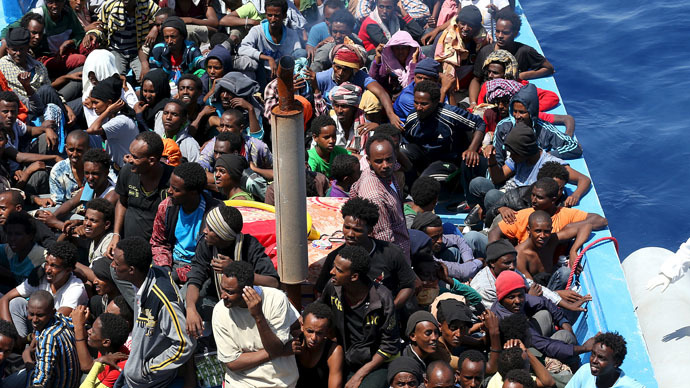EU migrant crisis: WikiLeaked docs outline naval op, reputation risk management

WikiLeaks has published two classified documents revealing details of a EU plan for military intervention to curb the influx of migrants from Libya, and an information strategy to “facilitate expectation management” and avert reputation risks.
The European Union foreign ministers agreed to form a naval mission in the Mediterranean Sea targeting gangs smuggling refugees from Libya to Europe on May 18.
One of the classified documents published by WikiLeaks on Monday reveals details of the planned year-long military operation against human traffickers. The 11-page document, drafted by the EU defense chiefs, outlines plans to destroy vessels along the Libyan coast as well as target transport networks and infrastructure within Libya’s borders.
The second, 6-page EU Politico-Military Group advice paper on the military intervention lists recommendations on tackling human trafficking networks in the Mediterranean and outlines propaganda initiatives to sell the military option to the public.
The EU military chiefs’ advice centers on the notion of drawing a “full range of surveillance” and other intelligence data from EU member states and making “systematic efforts to identify, capture and destroy vessels before they are used by traffickers.”
In this context, the European Union Military Committee (EUMC) highlights the need to create an information exchange and the “coordination of the use of military assets” between partners supported by Brussels (inter alia EEAS [European External Action Service] Single Intelligence Analysis Capacity – SIAC).
READ MORE: EU agrees to Mediterranean naval mission to stop migration flow amid controversy
With regards to the use of force, the EUMC highlighted the need to layout Rules of Engagement, especially when it comes to the “seizure of vessels in a non-compliant situation, for the neutralization of smugglers’ vessels and assets, for specific situations such as hostage rescue and for the temporary detention of those posing a threat to the force or suspected of crimes.”
The plan also envisions possible engagement with Islamic State (IS, formerly ISIS/ISIL) fighters “within the Libyan sovereign area.”
“The threat to the force should be acknowledged, especially during activities such as boarding and when operating on land or in proximity to an unsecured coastline, or during interaction with non-seaworthy vessels. The potential presence of hostile forces, extremists or terrorists such as Da'esh [ISIS] should also be taken into consideration,” the document highlights.
The authors of the leaked document admit that the operation should be backed by a clear information strategy that would “avoid suggesting that the focus is to rescue migrants at sea but emphasize that the aim of the operation is to disrupt the migrants smuggling business model.”
While the plan lists Libya and North African regional neighbors among the areas to be targeted by the information campaign, it also acknowledges the risks of negative international publicity “should loss of life be attributed, correctly or incorrectly, to action or inaction by the EU force.”
Consequently, PMG stressed the need for a public messaging campaign to “avoid misperception on the operation’s mandate and to manage expectations.”
To protect individual operation commanders from being held “personally responsible for an action executed under their command” as well as to avoid damaging “EU reputation,” the document noted the need to have “clear legal frameworks and protocols in place prior to Operation launch, ideally with a UNSCR under Chapter VII and a complementary invitation by a legitimate LBY government.”
At the same time the authors acknowledge that “the political End State [of the military intervention] is not clearly defined” and recommend that the European Commission issue further guidance. The document emphasizes the need to avoid destabilizing the political process or causing “collateral damage” in Libya that might result in disrupting “legitimate economic activity.”
While the classified material acknowledges the main goal of the operation is fighting traffickers, and not preventing the loss of human life, the EU Politico-Military Group advice (PMG) paper recognized that search and rescue, “while not part of the core mandate of the operation”, should be administered according to international law.
At the same time, the 6-page document notes that a visible EU naval force along the coast of North Africa could have a “counterproductive effect” in preventing human smuggling, noting that the “smugglers’ business model will invariably adapt.”












